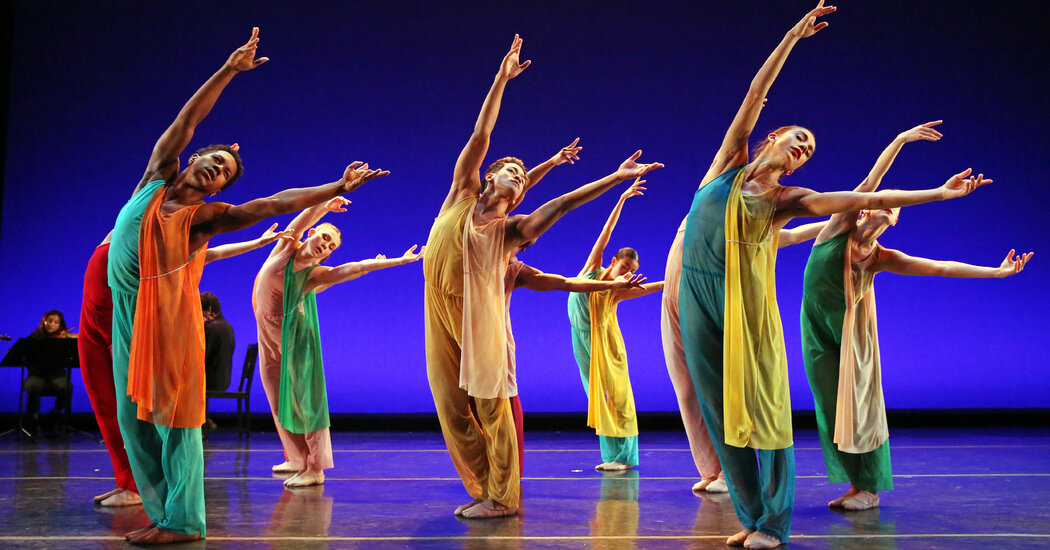As a genre, contemporary ballet can feel nebulous and far-reaching — for better or worse, anything goes. In the case of BalletX, a Philadelphia company formed by Christine Cox and Matthew Neenan in 2005, the aim is to produce new works expanding the possibilities of ballet. It’s a noble cause.
For its program at the Joyce Theater in Manhattan, which began on Wednesday, BalletX offered a trio of recent works, including an older dance by Neenan and a pair of New York premieres, both from 2022, by Jennifer Archibald and Jamar Roberts. The choreography had a certain angle, a certain point of departure — even a certain splashiness — but it remained less than memorable.
Two featured live music, including Roberts’s “Honey,” whose focus — as hinted at in the title — is love. After an opening section, the six dancers pair off in three duets, or three sides of love. It’s not all sunshine and kisses.
Roberts, the former resident choreographer of Alvin Ailey American Dance Theater, where he was also a longtime dancer, has been known to explore the interior, hidden parts of people and communities. In “Honey,” as well as in his flawed, cinematic “In a Sentimental Mood” (2022) for Ailey, he seems interested in what goes on behind closed doors. How can love prevail? “Honey,” a program note states, speaks “to the complexity of the human heart and our never-ending quest for love and human connection.”
That’s a lot to cover in 18 minutes. A short dance that feels long, “Honey” — set to four songs arranged by the pianist and composer Don Shirley — depicts three relationships, or multiple sides of one: The thrill of youthful passion; the tension of a partnership that is more complicated, more fraught; and, finally, the aspirational portrayal of what love can be.
Roberts’s choreographic palette of love and war is guided by extremes of mood and movement as dancers, wearing Mark Eric’s metallic costumes, expose emotions through their bodies: tender and taut, soft and abrasive. After the playful, darting dynamic of the first couple — Itzkan Barbosa and Shawn Cusseaux — a gloom falls on the middle couple, Jared Kelly and Ashley Simpson.
Like boxers in a ring, they descend into deep pliés and lean into aggression with swipes and spins. Simpson, the most compelling dancer throughout the evening, holds Kelly’s face, peering into his eyes with an air of frustration before dropping her hands in weariness. In the final moment, he leaves her.
The third duet is guided by symmetry: Francesca Forcella and Jerard Palazo stand side by side drawing their arms and legs through the air and swaying together and apart in tandem. They don’t exactly mirror each other but complete each other in ways more sentimental than stirring. “Honey,” unfortunately, feels like standard fare. When Roberts started choreographing for Ailey, his work was blazingly fresh, musically apt, born from imagination. “Honey,” along with some other dances he’s made more recently, seems ordinary, and that’s troubling.
In Archibald’s “Exalt,” the throb of electronic house music turned the stage into something of a club, aided immensely by Brandon Stirling Baker’s lighting, which gave Olivia Mason’s slick, shiny skirts for the men and leotards for the women an extra glimmer.
The women, for a change, wore pointe shoes, but the men dominated the stage with fiery spins and flying jumps that left the women in upright, more rigid states. Body undulations looked sexy on some and awkward on others. Technically, the dancers were erratic, and because of that, “Exalt” had a beat but little bite.
The program opened with Neenan’s “Credo” (2016), fueled by the choreographer’s visits to India, set to music by Kevin Puts — the title is taken from his string quartet — and Haydn. Musicians from the chamber group Ensemble132 performed onstage with the dancers, who started out in a pack, like a congested crowd. They worked their way through unison choreography that had them, at times, stretching an arm and flicking an index finger like dropping ash from a cigarette. Hands slithered up chests to cover faces and heads; shoulders rose, pelvises tucked, legs buckled.
Couples appeared at the front of the stage for duets, but often more interesting was what was happening behind them along the back. And that had much to do with what they were wearing.
It’s hard to say what “Credo” would have been without its costumes, designed by Reid & Harriet and featuring sheer, colorful jumpsuits, each affixed with a piece of flowing fabric like reimagined saris. Free-flowing swirls of vivid hues and textures contrasted with stillness, transforming the dancers into bas-relief carvings. Costumes can enhance a dance, they can distract from a dance — and they can also ground it. Here, they gave the choreography life.
BalletX
Through Sunday at the Joyce Theater, Manhattan; joyce.org
